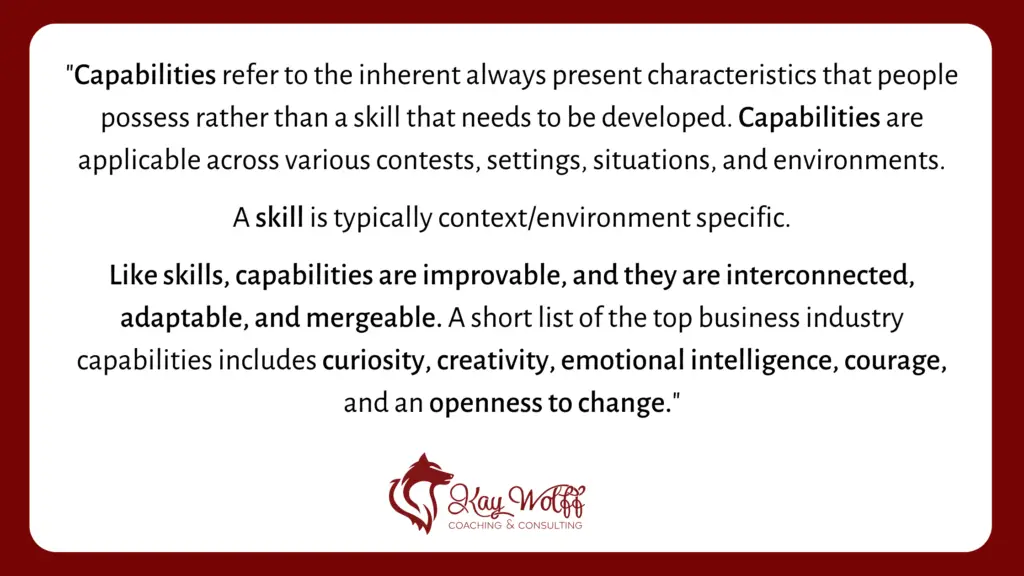I have had several people ask me why “capabilities” are a hot topic in the talent and development literature. And, I have been asked why capabilities are replacing skills. My short answer to these questions is . . . Yes, capabilities are an important topic, but they should not replace skills. I feel there should be a focus on both capabilities and skills in the workplace. Let me explain more.
The World of Work is Changing
The world of business is becoming an increasingly volatile, uncertain, challenging, and ambiguous (often referred to as VUCA) place to work and thrive. The past two years have demonstrated the need for a more flexible, resilient, innovative, and patient workforce but people in organizations need help navigating constant change, high-pressure demands to do more with less, and little patience and support from their leaders.
An organization needs talented people and talented leaders, but most organizations select, promote, and develop their people according to the knowledge, skills, and abilities (abbreviated as KSAs) the organization wants or needs at that moment. These KSA attributes are the tactical aspects of what people do in the course of their job/work.
Common KSA attributes include:
- creating a product
- managing projects/people
- gathering data
- generating reports
- active listening
- collaboration
- public speaking
Skills are Important but not Enough
Every organization knows that they need the right skills developed at the right level and employed at the time. However, VUCA environments are making it more difficult for organizations to align talent at the right time or they often find the fast-paced changing landscape requires talent they do not possess. Therefore, skills are still important, but they are no longer enough. This is where capabilities can be leveraged to help fill the gap. Both a focus on capabilities and skills in the workplace is the best combination.
The Difference in Capabilities and Skills
Capabilities refer to the inherent always present characteristics that people (currently) possess rather than a skill that needs to be developed. Capabilities are applicable across various contests, settings, situations, and environments whereas a skill is typically context/environment specific. Capabilities and skills are both improvable, and they are interconnected, adaptable, and mergeable. A short list of the top business industry capabilities includes curiosity, creativity, emotional intelligence, courage, and an openness to change.

The Importance of Capabilities in the Workplace
Tapping into capabilities helps organizations to navigate difficult landscapes through curiosity and creativity, which require imagination and help people to navigate a changing landscape by asking open-ended questions, creating new value for what’s possible, looking for new ways to adapt, and regularly looking inward to access their hidden talents. When organizations embrace and support curiosity and creativity, they enhance the willingness and courage to challenge the current way of doing things. In doing so, they allow curiosity and creativity to shake things up so new opportunities can surface.
Other capabilities include an inclusive mindset that taps into the collective talents, wisdom, and abilities of everyone in the organization. This type of collective organizational wisdom tapping leads to richer data gathering, better decision-making, higher performance, and sustainable changes or outcomes.
To learn practical tips to improve capabilities in your workplace, visit my blog post 5 Tips to Bring Capabilities into Your Work in 2023.
The Two Become One
In a nutshell, capabilities are the “other” characteristics that help people to think outside of the proverbial box, take new initiatives, and tap into the deeper and broader talent within an organization – leading to better resiliency in dealing with a VUCA world. The old KSAs become KASO’s or knowledge, skills, abilities, and other characteristics. So, we need them all. There is a strong need for both capabilities and skills in the workplace and one should not replace the other but work in tandem. When you grow in both your skills and capabilities, it is always a win!
Want to grow your own capabilities and apply them to both your work and life, professional coaching is the perfect answer! Wolff Coaching would love to work with you to help you make the most of your skills and improve your capabilities. Schedule a complimentary consultation call to learn more or a capabilities coaching session today at https://go.thryv.com/site/KayWolffCoaching. Wolff Coaching offers workshops throughout the year for both individuals and groups. Check out my upcoming workshops on capabilities and more at KayWolff.com.
For more on Capabilities see: https://www2.deloitte.com/us/en/insights/focus/technology-and-the-future-of-work/building-capability-unleash-business-performance.html
By A. Kay Wolff Kripchak, Ph.D.
I/O Psychology and Coaching Expert
KayWolff.com
